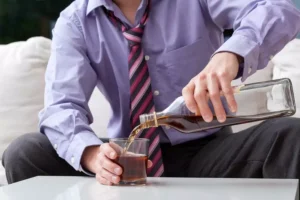
Click here to learn more about helping someone with alcohol use disorder. Research shows that only a small portion of people with AWS require medical treatment. If you decide to get treatment, your doctor can recommend the type of care that you need. It’s important to be honest about your alcohol use — and any other substance use — so your provider can give you the best care. Alcohol (ethanol) depresses (slows down) your central nervous system (CNS). If you consistently consume significant amounts of alcohol, your CNS gets used to this effect.
Who is at risk for alcohol withdrawal syndrome?
- In some cases, AWS can be a medical emergency and — if complications arise — potentially life threatening.
- Many involve a combination of group psychotherapy (talk therapy) and medications.
- The prognosis (outlook) for someone with alcohol withdrawal depends greatly on its severity.
- In addition, vitamin supplements may be given to replace essential vitamins that are depleted by alcohol use.
Mild withdrawal symptoms often begin within 6 to 12 hours after your last drink. There are several mild to moderate psychological and physical symptoms you might experience when you stop drinking. Eating nutritious food, exercising, and getting enough sleep can help reduce some withdrawal symptoms, such as mood swings. If don’t have alcohol withdrawal syndrome symptoms much of an appetite, you may want to take a multivitamin or drink a beverage high in electrolytes, such as a sports drink. If you take prescription medication, continue to take it as directed. Alcohol withdrawal is caused by the abrupt cessation of alcohol consumption in patients with alcohol dependence or chronic alcoholism.
Alcohol Withdrawal Treatment
- Most treatment options may include the administration of long-acting benzodiazepines.
- Symptoms of AW can range from mild tremors and anxiety to severe complications such as hallucinations, seizures, delirium tremens, and life-threatening metabolic issues [3].
- But if you’ve gone through alcohol withdrawal once, you’re more likely to go through it again the next time you call it quits.
- A person may notice initial symptoms after a few hours that could last for up to a week or longer.
- The goals of alcohol withdrawal treatment are to reduce symptoms, prevent complications, and help maintain abstinence from alcohol.
When the alcohol level suddenly drops, your brain stays in this keyed up state. The prognosis (outlook) for someone with alcohol withdrawal depends greatly on its severity. Each of these symptoms can increase in intensity depending on the severity of the withdrawal. Research shows people who have a supportive social network are more likely to remain alcohol-free after withdrawal.
Alcohol Withdrawal Symptoms
The CDC defines it as more than 15 drinks per week for people assigned male at birth and more than 8 drinks per week for people assigned female at birth. With long-term heavy alcohol intake, your brain adapts to the effects of booze over time. Minor alcohol withdrawal symptoms typically set in about 6 hours after your last drink and may last 4 to 48 hours. Still, if you’re experiencing withdrawal symptoms, it’s essential to get evaluated by a healthcare professional. Depending on the severity of your symptoms, your doctor may recommend monitoring a medical setting or at home.
- There are many resources available for anyone who is ready to stop drinking for good, or who wants to reduce the harm alcohol is causing in their life by cutting down.
- If you regularly consume caffeine and then stop, you’re not getting the stimulant your body has become used to.
- Additionally, this study’s relatively small sample size of 100 patients and the further randomization of these patients to one of four treatment arms limited its statistical power.
- It typically occurs because of a genetic difference that makes the body unable to break down alcohol efficiently.
- You may also receive other medications or treatments for related health issues, like IV fluids for dehydration and electrolyte imbalances or antinausea medicines if you experience vomiting.
- The most prescribed benzodiazepine is chlordiazepoxide, which is only available as a generic in the United States.
Proposed regiments include fixed dosing with as-needed doses available. Should symptoms worsen, patients and their support person should be instructed to present to the emergency department for evaluation and further treatment. Treatment can occur in various settings, such as the emergency room, outpatient clinic, intensive care unit, or detoxification facility. Consequently, the interprofessional healthcare team must ascertain the most suitable setting based on a patient’s symptoms.

Timeline of Alcohol Withdrawal Symptoms

Long COVID is a type of PVF that involves new or worsening COVID-19 symptoms months or years after the initial infection. Choose a symptom and answer simple questions using our physician-reviewed Symptom Checker to find a possible diagnosis for your health issue. This information https://ecosoberhouse.com/ provides a general overview and may not apply to everyone. Talk to your family doctor to find out if this information applies to you and to get more information on this subject. There are also medicines your doctor may prescribe to help with maintaining your sobriety.
What are the symptoms of alcohol intolerance?

Having a history of seizures increases your risk for withdrawal seizures. A doctor can perform a typical checkup and a blood test to see if the individual is still in good health or needs a treatment plan or medication. Others experiencing more severe symptoms may require hospitalization to avoid life threatening conditions. A doctor may also need to administer fluids intravenously to prevent dehydration and correct electrolyte abnormalities. They may also need to give medications to help reduce the severity of the symptoms. For most people, alcohol withdrawal symptoms will begin to subside after 72 hours.
- The symptoms can range from mild to severe, with the most severe being life-threatening.
- Call for an appointment with your provider if symptoms persist after treatment.
- It’s also important to note that delirium tremens can be life-threatening.
- If your symptoms become more severe, it’s essential to reach out to your treatment team and seek professional help right away.
- Individuals with alcohol withdrawal syndrome may experience nausea, anxiety, extreme fatigue, and even seizures and hallucinations.
- AWS is more common in adults, but children and teenagers who drink excessively may also experience the symptoms.
If you’re experiencing these symptoms, it’s especially important to stay well hydrated. People who do have depression may want to avoid heavy caffeine use on a long-term basis. Not only can excessive caffeine intake make depression symptoms worse, but so can caffeine withdrawal in people with caffeine use disorder. If you frequently consume caffeine, you may develop tolerance to its effects, which can lead to physical or even psychological dependence.
